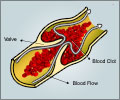Heart attack and stroke can be kept at bay by consuming food rich in unsaturated fats like olive oil and having a good night’s sleep, reveals a new study.
- The main reason why foods rich in unsaturated fats like olive oil may protect against heart or cardiovascular disease has been uncovered
- Consuming foods rich in unsaturated fats, such as olive oil increases the levels of ApoA-IV, thereby reducing the risk of heart attack and stroke
- Levels of the protein ApoA-IV are high during the night. Therefore, having a good sleep could also avert cardiovascular events
One of the steps involved in the formation of a blood clot is platelet aggregation wherein platelets send out signals to other platelets to clump or aggregate together on top of the clot.
Platelet aggregation inside a blood vessel can cause occlusion that blocks blood flow or supply to the heart muscle leading to thrombosis, thereby increasing the risk of death and disease rate, worldwide.
The receptor involved in platelet aggregation is a platelet surface glycoproteins called GPIIbIIIa or integrin αIIβ3.
The current research suggests that ApoA-IV blocks the integrin αIIβ3 receptor inhibiting clot formation and preventing thrombosis.
How Does the ApoA-IV Act?
The process of platelets bonding to one another involves integrin αIIβ3, which first binds to fibrinogen (another plasma protein that bridges platelets in the blood), which in turn binds to another integrin αIIβ3 receptor on another platelet. Thus fibrinogen allows many platelets to bind one another, leading to platelet aggregation.Dr. Ni, a scientist at Canadian Blood Services Centre for Innovation, and his team showed through lab models and humans that ApoA-IV connects to integrin αIIβ3 and competes or blocks fibrinogen binding, thereby, decreasing platelet aggregation in a blood vessel.
"This is the first study to link ApoA-IV with platelets and thrombosis. With this work, we have also explained why higher levels of ApoA-IV can slow down plaque build-up in blood vessels, known as atherosclerosis, because this process is also related to platelet function,” said Dr. Ni.
Other important roles played by ApoA-IV are as follows:
- Platelets get stimulated in response to a meal for ease of interaction with one another and with white blood cells. Levels of ApoA-IV also increase in circulating blood, especially after eating meals rich in unsaturated fats. This decreases the platelet hyperactivity and bonding, and reduces the inflammation after meals, thereby lowering the risk of heart attack and stroke.
- ApoA-IV seems more active at night when we sleep (protecting us from a cardiovascular event) and least active when we wake up in the morning.
The team plans to get a deeper understanding of the protein and use its protective nature to build therapies that target heart disease, which stems from platelet activation and aggregation.
Reference:
- Xiaohong Ruby Xu, Yiming Wang, Heyu Ni., "Apolipoprotein A-IV binds αIIbβ3 integrin and inhibits thrombosis" (2018) Nature Communication.
Source-Medindia
















